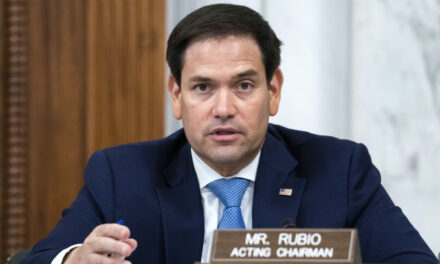We support our Publishers and Content Creators. You can view this story on their website by CLICKING HERE.

Tennessee’s Republican Governor Bill Lee is determined to make his state the latest to overhaul its education system to embrace school choice, but with a deadline to get it done just a few weeks away, several hurdles remain.
With two weeks remaining before the legislative session of the Tennessee General Assembly comes to a close, lawmakers in the state House and Senate have put forward two very different versions of Lee’s proposed school choice measure, known as the “Education Freedom Scholarship Act.” Despite the differences, both legislative leaders and Lee tell The Daily Wire they are confident they will get a school choice measure passed, though precisely what it will look like won’t be known until the end of the session on April 25.
Lee’s school choice plan calls for scholarships worth $7,000 to be made available to 20,000 students in the 2024-2025 school year. Of the available scholarships, half would be reserved for poor people, with the remaining half allocated on a first come, first serve basis. The goal for the next school year would be for universal eligibility for all students in the state to use at private schools, charter schools, or for homeschool families.
“A parent ought to decide where their kid goes to school and what they learn, and not the government,” Lee told The Daily Wire in an interview. “That’s what choice is really about: the government not deciding everything about a kid’s education in a state, but the parents deciding that.”
The House and Senate versions of the Education Freedom Scholarship Act have been working their way through committees over the last several weeks. Both versions set aside around $144 million for the 20,000 scholarships and do not automatically expand the amount of scholarships, meaning the cap would need to be lifted by future General Assemblies. They both also reserve 10,000 for lower-income students and 10,000 more broadly open for anyone. However, who and where the scholarships can be eligible depends on which version gets passed.
The Senate version, sponsored by Senate Majority Leader Jack Johnson, a Republican, closely mirrors Lee’s proposal. It would make the scholarships available for the 2024-2025 school year for use at private schools and for homeschool families, as well as allow students to choose their public schools. Additionally, the Senate version would require scholarship recipients to take an annual norm-referenced test approved by the state board of education.
The House version, sponsored by House Majority Leader William Lamberth, also a Republican, allows for the scholarships to be given out to Tennessee students for use at private schools. However, the scholarships have more limited eligibility, as it designates them only for use at private schools. Unlike the Senate version, they could not be used by homeschool families, and there is still limited choice for public schools.
The school choice proposals have received the usual criticism from teachers unions, but have also received critiques from some conservative activists who say that school choice legislation could be fiscally irresponsible, introduce backdoor ways for the government to regulate Christian schools and homeschoolers, and fund education for illegal immigrants.
Lee said he understood those concerns about government regulation and said that there would be protections for homeschool families and private schools that participate in the program. Lee told The Daily Wire that he believed that “less government is better government” and that the goal of his legislation would be to allow parents to allocate their tax dollars toward the kind of education they want for their kids.
The exact details about what safeguards might be in place remain somewhat up in the air as lawmakers negotiate the specifics of the education scholarship program. Parents and schools could also decline to participate in the program.
When asked about concerns about the scholarship program introducing cumbersome regulations on private schools or homeschools, Johnson, the Senate leader, said the bill was an attempt to give parents more opportunity to choose how their children should be educated, and not an attempt to “take over” private schools.
He said he would “fight tooth and nail any attempts” to introduce more regulations for private schools and homeschool families.
Lamberth said the concerns about fiscal responsibility are why the House formulated the program the way it did.
“We would expand as possible as we go forward. Here in Tennessee, we are always very fiscally conservative. We balance our budget every year,” Lamberth told The Daily Wire. “We are just very careful not to have a program that has no fiscal constraints on it. So the intention would be to expand this program down the road, but we’re going to start out with 20,000 students.”
On the issue of the eligibility of illegal immigrants for the scholarships, the House reserves the scholarships for citizens while the Senate version stays away from that issue.
Johnson said he did not want to introduce anything in the Senate version that would place the measure in danger of getting tied up in court. In 1982, the Supreme Court ruled that states have to provide education to all children in the state regardless of whether they are in the United States legally or not.
While there are still major differences still being debated, Lee said he was ”very hopeful and very confident” that a bill would make it to his desk. Johnson said he is “cautiously optimistic,” but acknowledged that the Senate and House versions of the legislation “do look a lot different.”
“Anything we can do to empower parents to make decisions that they believe are best for their child, we should do that, and that’s what this legislation does,” Johnson said. “For far too many families, because of their financial circumstances, they don’t have the resources or means to pick a different option for their kid, and so they are forced to go to the public school that they’re zoned for.”
Lamberth said he felt good about negotiations, and said working out differences is part of the legislative process.
Lee’s appeal for school choices comes weeks after Alabama enacted universal school choice and the Georgia legislature passed a $6,500 education savings account program backed by Governor Brian Kemp (R). In nearby Louisiana, a school choice measure is making its way through the legislature with support from even some Democrats.
Lee has argued that his school choice push is part of the growing movement across America of parents demanding more accountability from public schools over the quality of the education and values being promoted by public school teachers.
“This is an awakening of parents across America to the urgency and the need to be more engaged in the options for their children’s education, and to know what their kids are learning, and to be more engaged to where they’re learning it,” Lee said
Tennessee has already rolled out education scholarship programs in Nashville, Chattanooga, and Memphis through school choice pilot programs in previous years. Lee’s proposal would expand options for the whole state.
Corey DeAngelis, an advocate for school choice and senior fellow at the Federation for American Children, told The Daily Wire that he would consider any bill expanding school choice that makes it across the finish line a win, but that a state like Tennessee should be able to get a broad measure passed.
“Any school choice bill that expands opportunities for families would be a step in the right direction so either chamber’s version would be a win, but at the same time you have supermajorities in each chamber in Tennessee and you should be able to get full-throated school choice like they have in Arizona,” he told The Daily Wire.
DeAngelis said Arizona’s school choice measure, passed by Republican Governor Doug Ducey, should be the north star for conservative states. It included explicit protections for private schools from government overreach, and expanded options for all parents with no income restrictions or caps on available scholarships. He said ideal legislation allows for all families, regardless of income or zip code, to take their children to any form of school — public, private, or home.
What Tennessee’s final version will look like and how expansive it will be is still being decided, but the pressure is on to satisfy both critics and proponents of the bill as lawmakers push to make Tennessee the latest Red state to enact broader school choice.

 Conservative
Conservative  Search
Search Trending
Trending Current News
Current News 







